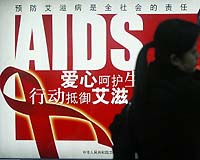| . |  |
. |
New York (AFP) Nov 5, 2009 News that US swine flu vaccines, meant to be prioritized for the nation's most vulnerable, are being distributed to Wall Street firms such as Goldman Sachs sparked uproar Thursday. The New York Department of Health said Citigroup, Goldman Sachs and Morgan Stanley have applied for supplies of the H1N1 vaccine and are eligible because they are large employers with in-house clinics. With H1N1 vaccines often scarce and populist anger already raging at Wall Street for last year's financial meltdown, the news triggered furor. Anna Burger, secretary-treasurer for the largest US healthcare union, the SEIU, said it was "obscene" that powerful and wealthy private organizations got vaccines when "at-risk Americans are either waiting in line for hours or getting turned away." "Last time I checked, the Centers for Disease Control and Prevention have not prioritized Goldman Sachs CEO Lloyd Blankfein and other Wall Street executives over the rest of America," Burger said. Democratic Senator Chris Dodd, from Connecticut, said he was "stunned." "It is shocking to think that private firms would be prioritized ahead of hospitals when the vaccine supply cannot meet the demand," he wrote in a letter to US Secretary of Health Kathleen Sebelius. New York City's health authorities said critics had got their facts wrong. Banks, as well as two universities in New York, were allowed to make orders because they had their own health clinics and there was enough vaccine to go round, city health spokeswoman Jessica Scaperotti told AFP. Vaccines won't be given to just any employee, but those falling into official at-risk categories, for example, pregnant women, health care workers, and people with chronic medical conditions, Scaperotti said. "What they (critics) have to realize is that all providers who order H1N1 vaccine -- whether it be a hospital or an employee health service -- they have to agree that they'll only administer the vaccine to people in at-risk groups," she said. So far, Citigroup has requested 2,200 vaccines and received 1,200, health department figures show. Goldman Sachs requested 5,400 vaccines and has received 200. Morgan Stanley, which requested 1,500, has not yet received any. Giant media corporation Time Warner requested 2,000 and has received so far 100. Scaperotti said 50 employee health clinics in the city had received vaccines. "As more becomes available we expanded that group to include providers that serve adults both in private practice and community settings." Nevertheless, the row fueled anti-banker sentiment at a time when Americans are struggling with nearly 10 percent unemployment and tight credit -- even as Wall Street stock prices and employee bonuses surge back. Melanie Sloan, executive director at the activists group Citizens for Responsibility and Ethics (CREW) in Washington scornfully questioned the logic of declaring bank staff at risk. She said CREW had been "unable to uncover the demographic makeup" of the banks in question, but "it seems safe to assume the vast majority of their employees are not pregnant women, infants and children, young adults up to 24 years old, and healthcare workers." Scaperotti said the anger was misplaced because vaccines were simply issued to those who asked as and when the supplies became available. She said that large companies were ideal targets for preventing the spread of flu. "Employee health clinics are a great avenue for vaccines," she said. Share This Article With Planet Earth
Related Links Epidemics on Earth - Bird Flu, HIV/AIDS, Ebola
 Experts warn of drastic AIDS funding shortfall
Experts warn of drastic AIDS funding shortfallWashington (AFP) Nov 3, 2009 The fight against AIDS in developing countries is facing a drastic funding shortfall amid rapidly rising treatment and prevention costs during the global financial crisis, experts said Tuesday. But the funding contraction also presents an opportunity to do better with less and save more lives by eliminating waste while improving the efficiency of medical care, said Robert Hecht, co-author of ... read more |
|
| The content herein, unless otherwise known to be public domain, are Copyright 1995-2009 - SpaceDaily. AFP and UPI Wire Stories are copyright Agence France-Presse and United Press International. ESA Portal Reports are copyright European Space Agency. All NASA sourced material is public domain. Additional copyrights may apply in whole or part to other bona fide parties. Advertising does not imply endorsement,agreement or approval of any opinions, statements or information provided by SpaceDaily on any Web page published or hosted by SpaceDaily. Privacy Statement |